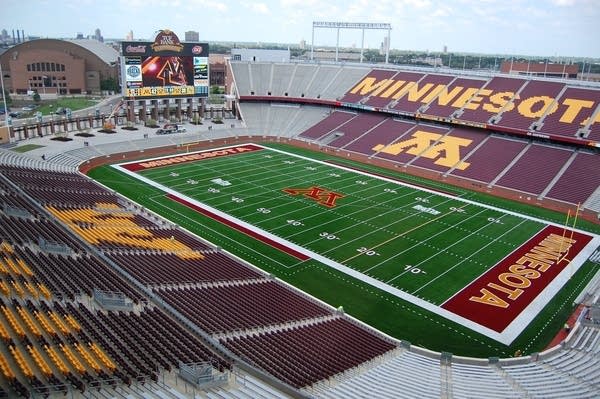Battle brews over beer sales at U of Minn. stadium
Go Deeper.
Create an account or log in to save stories.
Like this?
Thanks for liking this story! We have added it to a list of your favorite stories.

When the University of Minnesota opened its new on-campus football stadium last year, the stadium was dry - the result of an ultimatum by state lawmakers that alcohol be sold everywhere in the stadium or nowhere.
Now, legislators are taking another look and could give the university room to sell booze in premium seats while keeping it from stands filled by students and general ticket holders. A proposal rolling back the all-or-nothing law advanced Tuesday in a Senate committee, but its prospects were dimmer in the state House.
Sen. Sandy Pappas said her bill permitting limited sales would be a financial boost to the university, which had to offer discounts after backtracking on plans to offer beer and wine in luxury seats and suites. Pappas, chairwoman of the Higher Education Committee, said the decision to go dry cost the university $1 million to $1.3 million.
The university isn't pushing for the law change, but boosters working under the name Friends of Gopher Sports are. The group has three registered lobbyists, including former Senate Majority Leader Roger Moe.
Turn Up Your Support
MPR News helps you turn down the noise and build shared understanding. Turn up your support for this public resource and keep trusted journalism accessible to all.
"Every dollar helps," Moe said.
Budget bills moving through the Legislature would cut more than $30 million in university aid. The Pappas bill would require profits from liquor sales to go into a fund for athletic scholarships.
Pappas, DFL-St. Paul, said school leaders should have the power to determine where booze is sold.
"This is a college facility and the regents want to have a collegiate atmosphere that is not inundated with alcohol," Pappas said.
Rep. Tom Rukavina, who chairs the House Higher Education Committee, said he remains opposed to allowing alcohol sales in premium seating but not in general seating areas.
"The taxpayers paid for the majority of that stadium, not the suite holders," said Rukavina, DFL-Virginia. Rukavina said the university's stance to have alcohol only in luxury areas smacked of elitism.
It's not clear whether Rukavina can fend off a change, though; Pappas plans to tack her bill onto a broader college policy measure that will be voted on later in the session.
Another House member who opposed the two-tier alcohol policy last year said he's open to a compromise now.
Rep. Pat Garofalo, R-Farmington, said he didn't think the university would cut off all alcohol sales in response to the 2009 law. Beer was sold throughout the Metrodome, where the Gophers played the 28 previous seasons.
"It's foolish to ban all alcohol in all forms at all collegiate events. It just doesn't make sense," Garofalo said. "I am not completely surrendering on this but I am open-minded."
Even if the bill becomes law, University President Robert Bruininks and the Board of Regents would have to lift the blanket ban for alcohol to be sold during the 2010 season.
School spokesman Dan Wolter said the board hasn't decided on a response to the bill.



